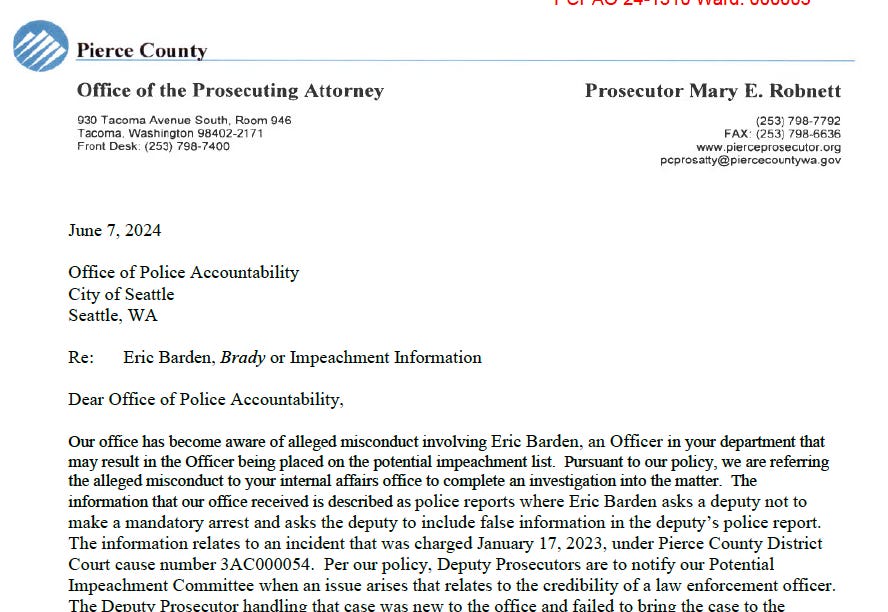SPD 'suspends' retired commander for asking deputy to falsify DV report

Former Deputy Chief Eric Barden violated Seattle police policy when he asked a Pierce County deputy to alter a report to spare his ex-girlfriend a mandatory arrest for a no-contact order violation, according to a disciplinary report released Friday. The discipline that the Office of Police Accountability recommended — a suspension of 135 to 270 hours — would have amounted to a $16,875 to $33,750 loss for Barden had he not retired to become a podcaster in December.
On Jan. 14, 2023, Barden called 911 to report that he saw his ex-girlfriend’s car pass his house and park up the road at a neighbor’s place. A no-contact order was in effect that prohibited his ex from being within 1,000 feet of him, and the neighbor’s home was well within that range.
The order stemmed from an incident that happened on Christmas, when his ex was arrested for malicious mischief after kicking in his front door. Barden sought a protective order because he claimed his ex’s behavior was “escalating.”
But when the sheriff’s deputies arrived, Barden had a change of heart. He told OPA that he initially called the police because he wanted his ex-girlfriend to take the protective order seriously. Barden added that he was concerned that she would paint him as the aggressor if things became physical.
His ex-girlfriend filed a criminal complaint over an incident that allegedly happened nine days earlier. She claimed that Barden threw her down. The Pierce County prosecutor declined to file charges because of insufficient evidence. Barden’s ex also waited 15 months to report it, which the prosecutor described as “problematic.”
Barden told the OPA that he felt conflicted. He wanted to hold his ex-girlfriend accountable but didn’t want her to be arrested in front of her grandson, who was in the car.
He asked the deputy if he could use his discretion not to arrest her. The deputy told him that it was mandatory to arrest for protective order violations. The deputy wrote in his report that when Barden told him he was an assistant chief for the Seattle police, it “surprised [him] greatly” because an officer at that level of command “should know the mandatory DV arrest laws in this state that have been in existence for many years.”
According to the police report, Barden asked if the deputy could say that she was outside of 1000 feet.
“I told Eric I would not violate state law and asked why he would ask me to do that, and he told me he wasn't asking, but told me it would be better for him if she wasn't arrested,” the deputy wrote.
Barden told the OPA: “I just said, you know, it’s fine with me either way, thinking that I’m the victim, so I might have a perspective or a vote in this. I was just offering that perspective, so I never asked anybody to lie.”

He said he “didn’t know” if it was under 1,000 feet. However, in his 911 call, Barden estimated the distance to the neighbor’s house to be about 300 feet, which was “remarkably accurate,” according to the OPA. Furthermore, because of the neighborhood’s layout, she would’ve had to drive past Barden’s house, coming within 150 feet, to reach the neighbor’s home.
The OPA sustained allegations of unprofessionalism against Barden, finding that he knowingly suggested that the deputies misrepresent the distance to the neighbor’s house to help his ex-girlfriend escape arrest.
Curiously, the OPA never considered dishonesty allegations in this case.


